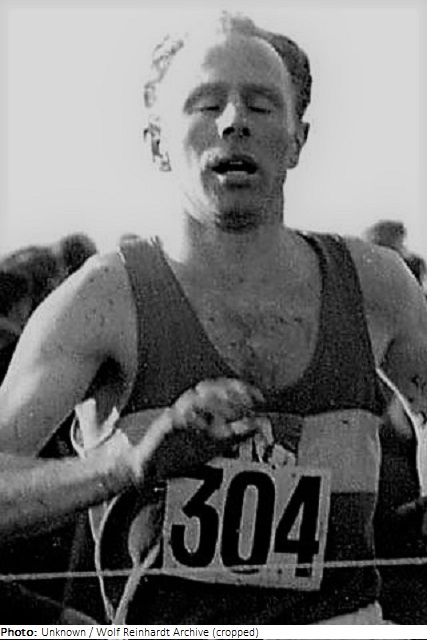
| Roles | Competed in Olympic Games |
|---|---|
| Sex | Male |
| Full name | Benjamin Basil•Heatley |
| Used name | Basil•Heatley |
| Born | 25 December 1933 in Kenilworth, England (GBR) |
| Died | 3 August 2019 (aged 85 years 7 months 9 days) in Worcester, England (GBR) |
| Measurements | 173 cm / 66 kg |
| Affiliations | Coventry Godiva Harriers, Coventry (GBR) |
| NOC |  Great Britain Great Britain |
| Medals | OG |
| Gold | 0 |
| Silver | 1 |
| Bronze | 0 |
| Total | 1 |
Basil Heatley grew up on a farm not far from Coventry in the English Midlands. Directed to running as it was thought he was too skinny to be a rugby player, Heatley excelled at cross country and regularly placed in the top ten at national junior cross-country championships although he was never to win a junior title.
In 1954 he began his three years of military service with the Royal Army Veterinary Corps and, with the bulk of his training being done in the early mornings, he entered and won his first marathon, the Midlands Marathon, in 1956. The following year he made a major breakthrough in cross country where he finished highly in the English Championships and then ran second to Frank Sando in the International Cross-Country Championships in Waregem, Belgium.
Heatley started out well in 1958 with a team title with England when the International Cross-Country Championships were held in Cardiff, but he failed to transfer this form to the track, and he missed selection for the British Empire Games. Heatley continued to excel over the cross-country tracks, helping England to team titles at the International Cross-Country Championships in 1959 and 1960 then winning the individual title in 1961 but a badly timed knee injury robbed him of a chance to qualify for the 10,000 m at the Roma Olympics.
After his victorious start to the year he raced a heavy schedule around the tracks of Europe in 1961 which was highlighted by victory in world record time in the AAA 10 miles. Tired from a long season and about to get married he took an extended break from training which ruined his chances of making a major championship debut in 1962 and he resolved that the marathon would now be his exclusive goal.
He placed second behind European champion Brian Kilby in the AAA marathon of 1963 but it was the 1964 Polytechnic Marathon, the trial for the British Olympic team, that sealed his place in history. Running head to head with Ron Hill both men beat Buddy Edelen’s year old world record but it was Heatley who crossed the line first in 2-13:55.
This established him as one of the major rivals to reigning champion Abebe Bikila as the Ethiopian attempted to defend his gold medal in Rome. Heatley struggled in the opening stages of the Olympic marathon after he developed a severe stitch but ran through his problems and rallied after the halfway mark. As he entered the stadium, he was in the bronze medal position and gaining on Japan’s Kokichi Tsuburaya. With a final sprint he gained 30 metres on the home athlete and passed him on the home straight to win the silver medal. Tsuburaya was crushed that he had been passed on the track by Heatley in front of the Tokyo crowd. He vowed to improve and pushed himself in training, but it resulted in multiple injuries. Finally, in early January 1968, Tsuburaya committed suicide by slashing his carotid artery with a razor blade.
The 1964 Olympic marathon was the last major race for the self-coached Heatley, although he continued to race for his club in national competition for many years afterwards. During his career he worked for Morris Motors but after Tokyo he went into groundsmanship and worked for his local council in the leisure and recreation department.
Personal Best: Mar – 2-13:55 (1964).
| Games | Discipline (Sport) / Event | NOC / Team | Pos | Medal | As | |
|---|---|---|---|---|---|---|
| 1964 Summer Olympics | Athletics |  GBR GBR |
Basil Heatley | |||
| Marathon, Men (Olympic) | 2 | Silver |